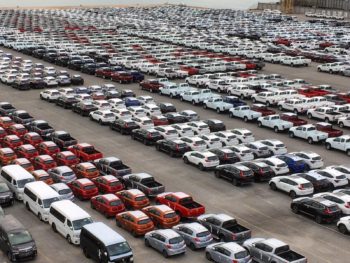New car registrations plummet to lowest level since 1998
UK new car registrations in July recorded their weakest performance since before the millennium, with both the semiconductor shortage and the pingdemic ‘throttling’ a full recovery.

The automotive sector continues to battle against shortages of semiconductors and staff
Just 123,296 units were registered last month, according to the latest figures from the Society of Motor Manufacturers and Traders (SMMT); a level last seen in 1998.
The figure was down 29.5% on the 174,887 units in July 2020 but the decline was artificially heightened due to showrooms only having just reopened a year ago following the first 2020 lockdown.
More tellingly, the July performance was down 22.3% on the average recorded over the past decade.
Fleet registrations were hardest hit of all and fell 33.4% year-on-year to 61,140 units. They were also some 28.7% lower than the average recorded over the past decade. The sub-25 business market fell by 25.2% compared to July 2020 while private registrations were down 25.1% year-on-year and fell 10.7% compared to the previous decade average.
Take-up of plug-in vehicles continued to rise though. Battery electric vehicle (BEVs) registrations grew 36.5% and accounted for 9.0% of the total market, while plug-in hybrids (PHEVs) were up 32.2% and took an 8.0% share. Hybrids were up 15.5% and took an 11.9% share. This means that nearly a third (28.9%) of cars registered in July were hybrid or electric.
Based on the decline, the industry has now revised the annual outlook down to 1.82 million units, still up some 11.7% up on 2020, but down from the 1.86 million forecast in April, and down around 21.8% on the average new car market recorded over the past decade.
But the figures also forecast that BEVs will account for 9.5% of registrations by year end, while PHEVs are forecast to comprise 6.5% of the market, collectively totalling around 290,000 units by the end of the year.
SMMT chief executive Mike Hawes said: “The automotive sector continues to battle against shortages of semiconductors and staff, which is throttling our ability to translate a strengthening economic outlook into a full recovery. The next few weeks will see changes to self-isolation policies which will hopefully help those companies across the industry dealing with staff absences, but the semiconductor shortage is likely to remain an issue until at least the rest of the year.”
Jamie Hamilton, automotive director and head of electric vehicles at Deloitte, also highlighted that the industry continues to face significant ‘headwinds’.
He continued: “With one in ten consumers looking to buy a car in the next three months, increasing supply in the market is likely to determine the speed of recovery.
“Such is the scarcity of new stock, combined with an ongoing global shortage of semiconductors, manufacturers are having to adapt what they deliver to clients; with some offering to retrofit chips when supply allows, in return for discounted or complimentary repair or annual services.”
Yesterday saw software provider VNC Automotive warn that the global semiconductor shortage is likely to outreach and outlast the Covid-19 pandemic, as the industry weathers the ‘perfect storm’. As a result, fleet operators are having to consider vehicles not on their choice lists to circumvent delays; earlier this year, FleetCheck reported that operators are facing “worst-ever” vehicle delays – and delivery times of up to a year are becoming common. According to VNC, OEMs are resorting to evasive action, including alternative chips.

















